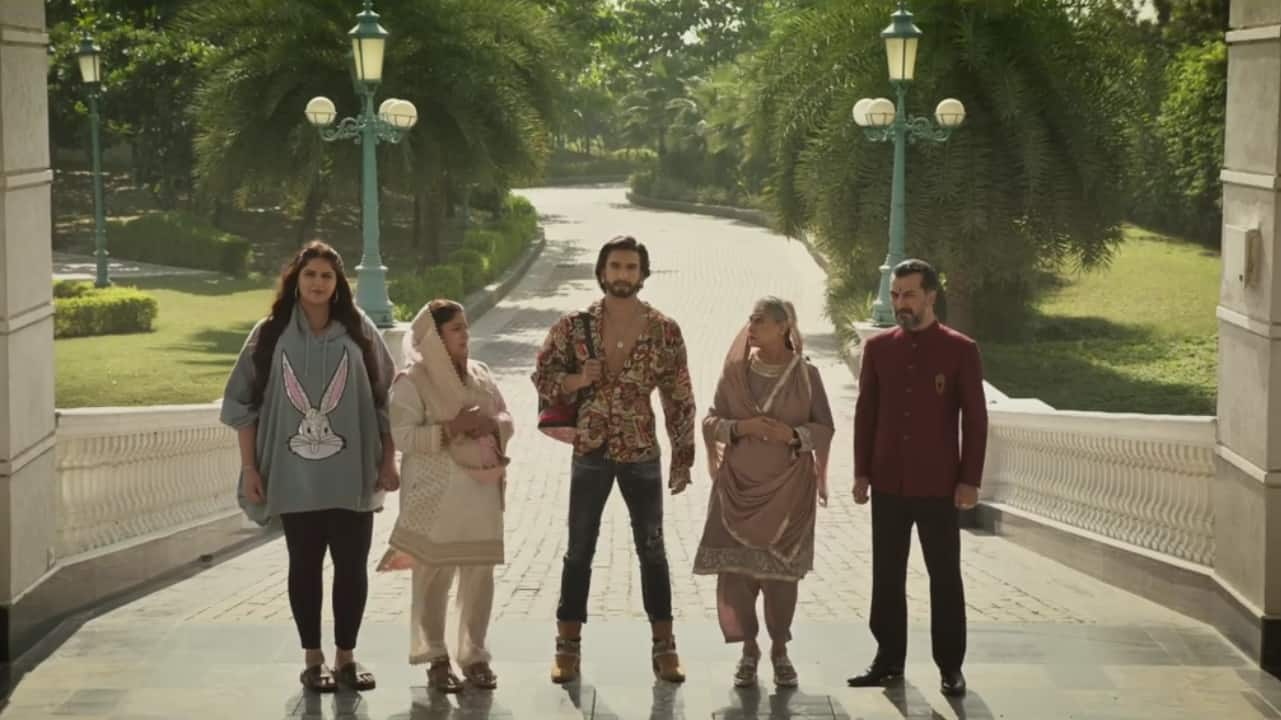



In a scene from Karan Johar’s Rocky aur Rani kii Prem Kahaani, Rani tells Rocky “Yeh koi love story nahi, ye lust story hai.” We have come to point in mainstream Hindi cinema where a young woman can disarmingly covet pleasure but also reject its traditional implications. Intimacy need not naturally lead to socially binding contracts. Consent, after all, allows for both fusion and fracture. Karan Johar’s latest film dials time back to an age where that elusive cinematic quality – chemistry – bounces off of faces, of wide-open arms and twitchy abdominal areas, as the great Indian romance finds its feet and some modernist spunk, in a film that though typically flawed, serves as a welcome upgrade to our ideas of larger-than-life love stories.
Alia Bhatt plays Rani, a feisty news anchor of Bengali descent. Ranveer Singh, plays Rocky, a typically buff, loquacious Delhi guy who walks around with a protein shake in hand. The two meet after Rocky’s grandfather (Dharmendra), a patient of Alzheimer’s, begins to call out the name of Rani’s grandmother, played by Shabana Azmi. In a bid to help the two meet, both Rani and Rocky cross wires that belong in different circuits of culture and upbringing. Rani’s sophisticated, soft Bengali heritage is at odds with the muscular configuration of Rocky’s family and his family business. Overseen by a stubborn, inflexible matriarch, played by Jaya Bachchan, his side represents a more traditional portrait of the Indian family. Cultures, egos and ideas about masculinity and romance clash, as the two come up with the absurdist plan of acclimatizing with each other’s families, by staying with them.
Rocky and Rani represent polar opposites, products of flawed but inescapable breeding grounds. Their families stand for competing worldviews, amounting to the kind of cultural battles that play out on the bodies of men and women. Interestingly, patriarchy is not the only thing under the scanner here. Cancel culture and elitism are dragged onto the turf where arguments are won and lost, jokes made and tears shed, as entire families and generations learn to reconsider the very idea of generosity and love. Not only does Johar manage to recreate that storied but missing spark between a leading pair in ages, but also attests it with the poignancy of a love story that couldn’t be. Both Dharmendra, and Azmi in particular, are bewitching in roles that though small, exert a sobering influence on a story that can get carried away with its own sense of grandeur. It elevates a familiar tale, into an orbit from where even the mushiest of Hindi cinema’s tropes feels timeless and inseparable from our galaxy of stories.
 (Screen grab)
(Screen grab)
Johar’s film is also riotous and funny, unserious in the best way possible. It isn’t ashamed of being unabashedly blind to the elitism it carries. People live out of mansions here, as careers and aspirations echo a prosthetic, but sellable origin. An episode where Rani helps the men of Rocky’s business, see the sexism in an ad campaign, feels unearned and insincere – as if lifted from a woke Twitter thread. Rani’s career as an outspoken female anchor, could have used some austerity for the sake of the times we live in. Sure, feminism has a certain newsroom vigour about it, but it fails to translate in sequences that also glamourize her disruptive candour. Bhatt, though, wades through the obstacles with ease. Johar’s films have never segregated entertainment from woke ideas, as each tryst with risk mandates a certain residual restraint. You can really rebuild families, and never quite break them apart. It’s after all the cinema of richly textured drapes and saris, snowy songs, and hollow soliloquies about the unyielding moral horse that Indian men and women spend a lifetime trying to straddle but can’t. None of it matters though once you submit to the splendour of cinematic denial.
What works for Rocky and Rani Kii Prem Kahaani, are its performances. Singh and Bhatt are exceptional in roles that must contemplate a new world order while building a bridge towards the old one. Aamir Bhashir as Rocky’s disgruntled father is commendable and so is the rest of the cast. These aren’t understated performances, but rusty, loud evocations of the kind of acting school that is increasingly become rare. Here, emotional conflict is supported by the sound of thunder, revelations punctuated by elaborate mannerisms. Hands are raised and blocked mid-way, in the most Bollywood-ish sense possible. “Keh diya toh bas keh diya,” Bachchan says matter-of-factly at one point. This feels like familiar territory, a return to the manipulative operas of yore where we left, and maybe even lost a bit of ourselves.
The key to unlocking hearts, Johar’s cinema has always believed, is to opening yours. It’s probably why his lovers weep, dance and articulate with curious abandon. The kind of abandon that fills cold, dark theatres with the warmth of voluntary delusion and reluctant inclusivity. It feels cynical to critique cinema so grand and optimistic in its outlook, so hopeful in its design, that you probably don’t mind its many mathematical blunders. For it at least gets the chemistry of it all right. Outside, the world is harsh, insecure, the problems far more sinister for any one woman or man to maybe solve. But at least inside our cinemas, we can, maybe recklessly, fall in love once again - with the very idea of love.
Discover the latest Business News, Sensex, and Nifty updates. Obtain Personal Finance insights, tax queries, and expert opinions on Moneycontrol or download the Moneycontrol App to stay updated!